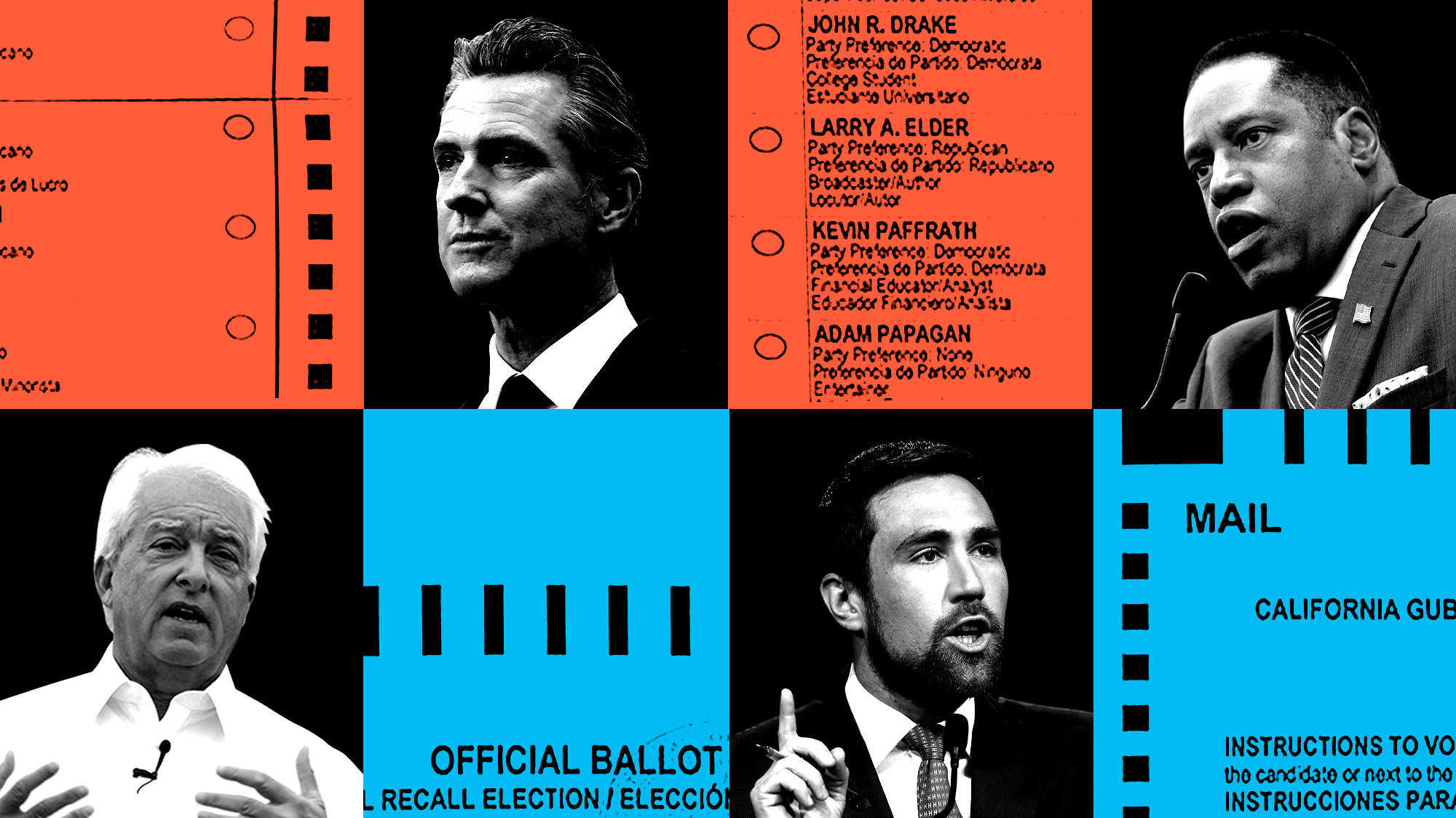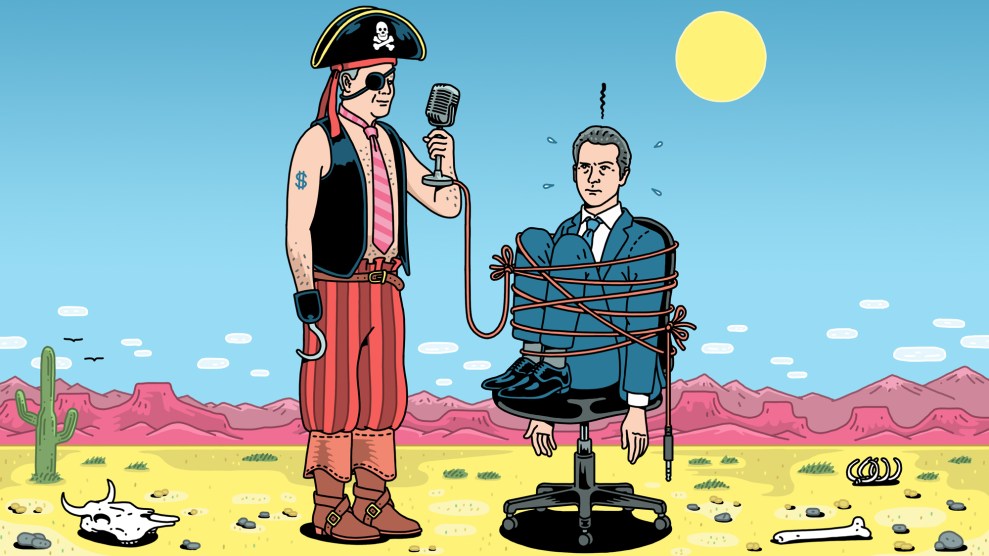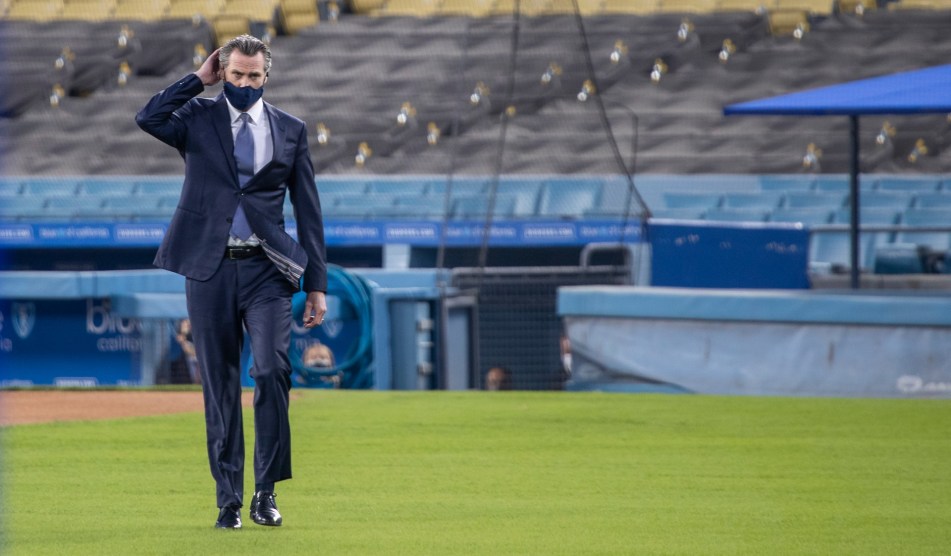In February 2020, at the start of the drive to recall California Gov. Gavin Newsom, axing the widely popular Democrat was the fringe project of anti-maskers, QAnon believers, and the state’s ever-shrinking hard right. For months, that’s what it remained. But as the pandemic rolled on—with businesses collapsing, mask and vaccine disputes spreading, and in-person schooling fights turning vicious—Newsom’s opponents gathered well over the million-and-a-half signatures needed to trigger a recall election. Californians now have until September 14 to answer two questions: Do they want to remove the first-term governor from office? And if he does go, who should replace him?
The recall process, an emblem of the state’s commitment to direct democracy, is tricky. For Newsom to stay in office, a majority must vote “no” on that first question. If that doesn’t happen, whichever hopeful wins the biggest share of votes will head to the governor’s mansion. 45 candidates are vying for that opportunity—among them a hog farmer, a sheriff, a self-described “Mandalorian warrior,” a landlord-slash-YouTube influencer, a libertarian rapper, several actors, a university lecturer, a bail bondsman, a participant in the January 6 insurrection, and the frontrunner, a right-wing radio host.
Newsom isn’t listed among those 45 candidates, and the state Democratic Party has encouraged voters to leave the second question blank—a point of contention for some recall opponents. (Two voters have filed a lawsuit to cancel the recall or add Newsom’s name to the candidate list, arguing that the state’s recall rules violate the 14th Amendment’s equal protection clause.)
Recalls have a way of attracting characters, some of whom garner more traction (and funding) than uber-credentialed politicians. California’s last gubernatorial recall, 2003’s takedown of Democratic Gov. Gray Davis, set a clown car of 135 candidates before voters. Some, like Rep. Tom McClintock and Lt. Gov. Cruz Bustamante, were experienced politicos. Others included HuffPost co-founder Arianna Huffington, Hustler publisher Larry Flynt, Diff’rent Strokes star Gary Coleman, and a Hollywood action star. Californians’ anger over rolling blackouts and a statewide recession helped that actor, Arnold Schwarzenegger, replace Davis in Sacramento. Then, as now, free media (and name recognition) are everything—and unlikely candidates are thriving.
Let’s meet some.
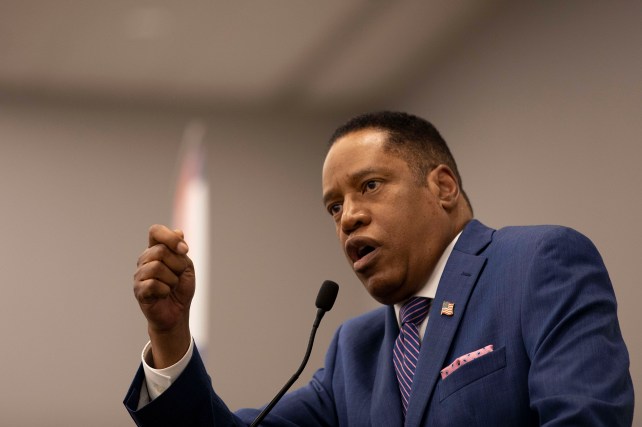
Larry Elder
The “Sage from South Central,” Black conservative radio host Larry Elder, leads a recent poll with a projected 23 percent of the vote. An Elder governorship would bring stark change to liberal California: Elder opposes both the minimum wage and abortion rights, and says his first order of business will be the repeal of all mask and vaccine mandates.
And then there’s his record of flagrantly misogynistic, racist comments.
“Women know less than men about political issues, economics and current events,” Elder wrote in a 2000 op-ed; in an April 2021 editorial, he argued that “George Floyd might be alive had former President Barack Obama not, for eight years, consistently played the anti-cop race card.” Elder’s former fiance recently accused him of brandishing a gun at her while high and demanding that she get a “Larry’s Girl” tattoo. (Two candidates, Caitlyn Jenner and Kevin Faulconer, quickly called on Elder to drop out.)
Elder, a longtime Trump supporter, has been a mentor to more notable conservatives. When he was still a teenager, senior Trump adviser Stephen Miller called Elder’s show to vent about his Santa Monica high school’s “left-wing indoctrination.” Elder invited Miller on air dozens of times, giving him his first taste of media notoriety and the power of the bully pulpit. And Elder mentored a young Alex Marlow, later Breitbart News’ editor-in-chief.
Elder isn’t alone in his anti-mask and vaccine takes—and he’s not the only candidate to be a little, well, weird. Meet some of the other contenders:
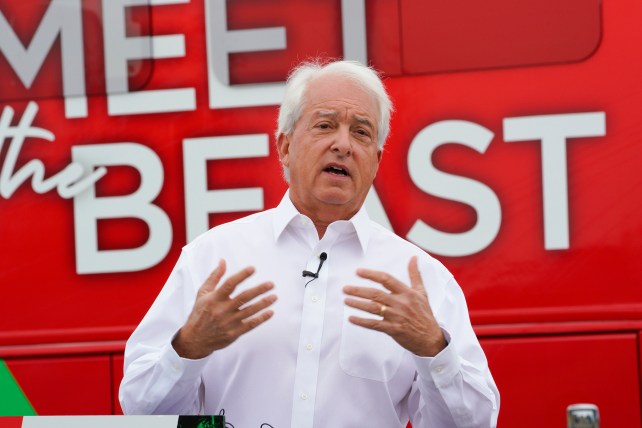
John Cox
The 66-year-old Republican multimillionaire, a San Diego–area suburbanite, launched his campaign by appearing alongside a wan (and allegedly drugged) half-ton bear named Tag. The stunt, which positioned Cox as the “beast” to Newsom’s “beauty,” is being investigated by local officials for potential violations of city codes. (It’s not clear how familiar Cox is with the plot of Beauty and the Beast.)
Cox, who already lost to Newsom in California’s 2018 gubernatorial race, calls the governor’s pandemic response “hysteria.” As governor, he’d push to make it easier to lock unhoused people into conservatorships, cut state income taxes by $30 billion, and do away with the state’s sanctuary law.
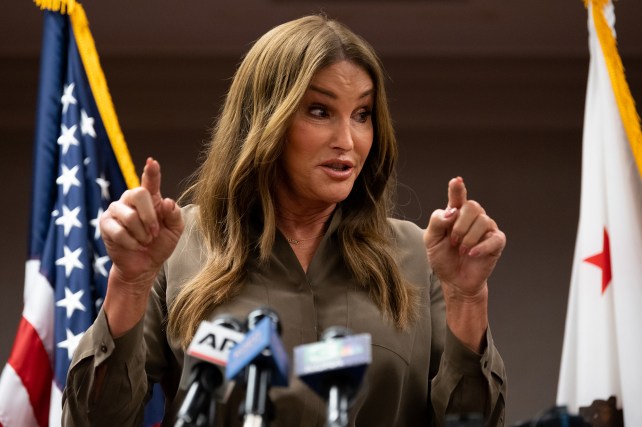
Caitlyn Jenner
The 71-year-old Olympic gold medalist and reality TV personality bills herself as a “thoughtful disruptor.” A Trump supporter—still holding out for Trump 2024—Jenner wants to realize the ex-president’s dream of a border wall. If elected, Jenner would also end California’s sanctuary-state status, “fully fund” police, and take a “tough on rioting” stance. Her athletic past notwithstanding, Jenner says it’s “unfair” for transgender girls to play in girls’ sports.
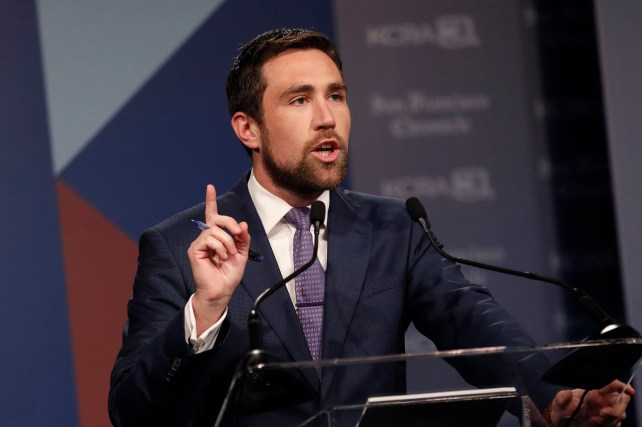
Kevin Paffrath
The 29-year-old Democratic real estate broker and “landlord influencer”—his finance and real estate YouTube channel boasts 1.6 million subscribers—is running on a 20-point plan to fix the state. Paffrath says he’ll end homelessness in his first 60 days in office, deploying the National Guard to relocate unhoused people into vacant commercial buildings. Two more of his 20 points: focus on “community policing” by “fully funding better training,” and legalize gambling to boost tax revenue.
A court denied Paffrath’s petition to be listed on the ballot as “Kevin ‘Meet Kevin’ Paffrath,” although he did land a trademark on the phrase “Meet Kevin™.”
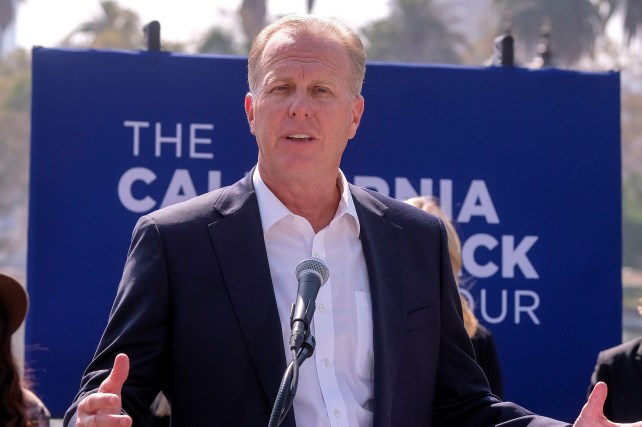
Kevin Faulconer
San Diego’s Republican ex-mayor, another Trump backer, wants to open more shelters and expand police sweeps of “tent cities.” Faulconer opposes calls to defund police, wants to add new reservoirs and invest in water infrastructure, and double the state’s wildfire prevention funding. This isn’t Faulconer’s first rodeo: Special elections sent him to the mayor’s office in 2014, San Diego’s city council in 2006, and even in 1988, San Diego State University’s student government.
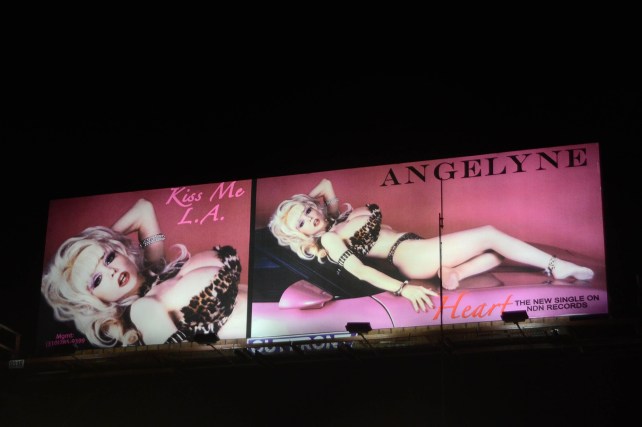
Angelyne
Iconic billboard queen Angelyne, famous for cruising around Los Angeles in her hot-pink Corvette, is taking another swing after a 29th-place finish in the 2003 recall. (Her slogan: “We’ve had Gray, we’ve had Brown—now it’s time for some blond and pink.”)
This time, she’s running on a more existential slogan: “The future of politics is now. The Angelyne Party establishes a new format of existence.” Like many gubernatorial hopefuls, Angelyne hopes to tackle homelessness by launching a state agency dedicated to its prevention.
Her criminal justice policies include releasing all people held on marijuana charges, implementing a three-strikes rule for police officers, and abolishing private, for-profit jails, as well as decreeing a statewide Bubble Bath Day during which Californians go out and clean something, anything—“a rock, a tree, your pet, your fiancé…or Angelyne’s car,” her spectacular website says.
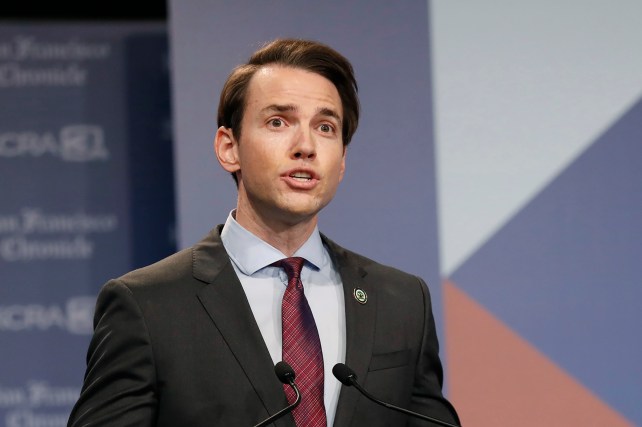
Kevin Kiley
This race is full of Kevins, and Republican Kevin Kiley may have the most political chops of them all. A state legislator since 2017, Kiley has criticized what he saw as the state’s slow vaccine rollout (though he opposes vaccine mandates and pushes for “bodily autonomy”). Kiley was pushed to run by Orrin Heatlie, the retired police sergeant who started the recall drive. If elected, Kiley says he’ll establish order and end Newsom’s “lawless mode of governance.” (Kiley also published a book titled Recall Newsom shortly before announcing his candidacy.)
Lesser-known candidates include Chauncey “Slim” Killens, a staunch Trump supporter who attended the January 6 Capitol insurrection; Armando Perez-Serrato, a self-described “Mandalorian” who would expand access to guns and blames “infected foreigners” for the US rise of COVID variants; and Fresno Republican Nickolas Wildstar, a digital marketer and SoundCloud rapper who ran unsuccessfully for governor in 2018. The youngest candidate, 20-year-old Ventura college student John Drake, is running on a sparse but progressive platform—and selling the most meme-y, Gen Z merch of all time.
There are nine Democrats in the race, including public school teacher David Moore, who doesn’t actually want Newsom recalled; Moore would shut down non-essential businesses to combat the Delta variant, and supports open borders. Some candidates have no party preference, like San Francisco State University lecturer Michael Loebs, who wants to implement a universal basic income, establish Medicare for All, and move California toward secession from the United States.
Central to many of the conservative candidates platforms’ is the promise to free Californians from the tyranny of mask and vaccine mandates. But California counties with the highest vaccination rates have generally had the fewest hospitalizations and deaths, and experts have cautioned that replacing Newsom with an anti-masker could quickly undo the state’s success in curbing the virus.
As we consider replacing @GavinNewsom with a more libertarian leader over handling of Covid (I guess), worth knowing that CA's per capita Covid deaths are ~21% below FL's, & ~16% below TX's. Translates into >10,000 Californians alive due to our performance.https://t.co/dsUktIdsSd
— Bob Wachter (@Bob_Wachter) August 24, 2021
And then there are the national implications: a Newsom successor might get to appoint Democratic Sen. Dianne Feinstein’s replacement, upsetting the 50-50 balance that gives Democrats control of the Senate.
In private conversations, California activists compare the Feinstein/recall situation to the loss of Ruth Bader Ginsburg’s Supreme Court seat. https://t.co/58DbkMZkAs
— Slate (@Slate) August 29, 2021
The recall’s success has already rippled through California, with petitions underway to recall everyone from Los Angeles and San Francisco’s reformist prosecutors to school board and city council members up and down the state. Newsom and the state Democratic Party have characterized the campaign as a “Republican recall,” but that characterization may end up working against them: The recall has captured support not just from 80 percent of California Republicans, but roughly a quarter of the state’s much larger Democratic contingent—along with more than half of independents. It has attracted hundreds of thousands of dollars in Silicon Valley backing, $1.2 million from a controversial real estate developer (as my colleague Russ Choma notes), and over $200,000 from oil and gas producers.
Yet Newsom remains popular among Democrats, garnering 75 percent approval in a late July poll. But that doesn’t guarantee enough Democratic turnout to outweigh the highly motivated Republicans campaigning against him. Eighteen months of pandemic precarity, along with two brutal wildfire seasons, have left many voters apathetic and disengaged. That’s likely to work in his opponents’ favor.
2003’s successful recall of Gray Davis was another low-turnout election. That race, says former Los Angeles City Council member Zev Yaroslavksy, caught voters by surprise—and favored the GOP opposition. “This is new territory,” Yaroslavsky told me earlier this year. “People thought Gray Davis would survive the recall.”
Davis ultimately lost that race by nearly a million votes. This time—with public health, climate, and perhaps the Senate in flux—the stakes are almost certainly higher.
Top image credits: Jeff Chiu/AP; Ana Ramirez/San Diego Union-Tribune/ZUMA; Nelvin C. Cepeda/San Diego Union-Tribune/ZUMA; Scott Strazzante/San Francisco Chronicle/AP
